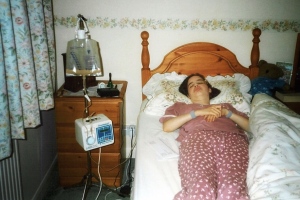Published in the Bristol Evening Post on 14th May 2001

Soapbox: ME Awareness Week
Most people nowadays have heard of ME, but few appreciate its seriousness or understand the impact it has on young lives. ME (myalgic encephalopathy) is perhaps one of the most misunderstood illnesses of our time. It is a neurological disease that can strike at any age, but has particularly devastating consequences in young people. There is a general, and grossly inaccurate, perception that the illness is little more than glorified tiredness. The emergence of the name chronic fatigue syndrome has only added to this myth.
So what is the reality of ME? “Fatigue” is certainly a symptom, but it is an exhaustion so profound and disabling as to be beyond the comprehension of healthy people. Thinking of ME in terms of tiredness is like dismissing Alzheimer’s as mere forgetfulness, or thinking of cancer as nothing more than having a lump. The utter exhaustion experienced in ME has been likened to how a normally healthy person would feel if they ran a marathon, whilst at the same time suffering from ‘flu and their worst hangover. ME is not about tiredness, but about feeling – and being – desperately ill.
Some ME patients suffer a milder form of the illness and are able to struggle on with their daily lives. Others are severely affected, and so debilitated by the illness that they are wheelchair, housebound, and even totally bedbound. It is not uncommon for patients to be left completely unable to walk or sit up, and to be paralysed and unable to speak. In severe cases eating becomes impossible, and tube feeding is required. Cognitive impairment is a common symptom, and can become so severe that the most simple thought processes are impossible: some patients even lose the ability to recognise their own families.
In addition to the sheer physical debilitation, ME sufferers experience great pain. The pain is intense, and often unrelieved by painkillers. Another common occurrence is that the brain becomes unable to cope with any stimuli, leaving the patient in agony at the slightest sound or faintest light. This robs the patient of even the simple pleasures of watching television or listening to music. Indeed, the sensitivities can be so acute that normal household life grinds to a halt, the patient being too ill to cope with the sounds and bustle of daily existence.
There is no cure or effective treatment for ME. Recovery is possible, but can take years of painful struggle, and for some never comes. For most people ME means many years of serious and destroying illness. Lives are shattered by this illness, particularly as it is still poorly understood, and even ridiculed. In young people the consequences of years of isolation at such a crucial time are devastating.
As someone slowly recovering from ME, having lost all my teens and early twenties to the illness, I know all too well that this is a serious and truly dreadful condition. Sometimes simply knowing that others care and understand can make a great difference. In this, ME awareness week, I ask readers to spare a thought for the many thousands of people suffering from the illness – many of whom will be too ill to even pick up this newspaper.
